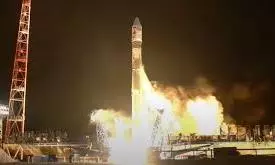
Mysterious object released by Russian Kosmos satellites raises eyebrows
text_fieldsA trio of Russian satellites launched earlier this year has triggered international curiosity after one of them released an unidentified object in orbit.
The development, spotted in March, has added a layer of intrigue to an already secretive mission.
The satellites — named Kosmos 2581, 2582, and 2583 — were launched in early February from Russia’s Plesetsk Cosmodrome and are now in near-polar orbits roughly 585 kilometers above the Earth. While Moscow has not officially disclosed the purpose of these satellites, recent activity has sparked widespread monitoring and speculation.
On March 18, space tracking agencies including the U.S. Space Force detected a new object in orbit. Initially linked to Kosmos 2581, the object was later suspected to be associated with Kosmos 2583. What stood out was the fact that the object was deployed while the satellite cluster was still operational — an uncommon move in standard satellite missions.
Even before this event, observers noted that the Kosmos satellites were engaging in "proximity operations," maneuvering closely around other orbital objects. These types of maneuvers are rare for routine satellites and suggest a more specialised — possibly strategic — objective.
Jonathan McDowell, an astrophysicist with the Harvard-Smithsonian Center for Astrophysics, highlighted that these deliberate maneuvers indicate the satellites are involved in more than basic space observation. Speaking to Space.com, he suggested the possibility of a military or experimental function.
As for the mysterious object, theories range from it being a component in a formation-flying test to a military payload. While a mechanical failure hasn't been ruled out, experts point out that such events typically create multiple debris fragments — which has not been observed in this case.
The "Kosmos" designation has long been used by Russia for both military and scientific missions, often shrouded in secrecy. Launching satellites in groups of three is also not unprecedented, as similar formations have been used by countries like the U.S. and China, usually for surveillance or coordinated research.






















